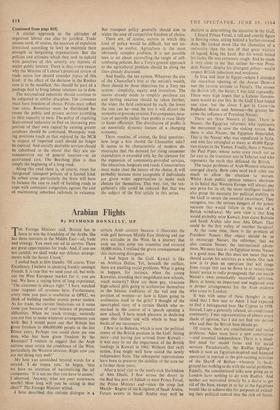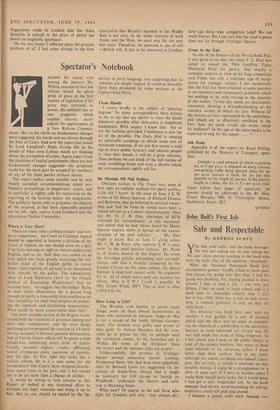Arabian Flights
By DESMOND DONNELLY, MP
rr HE Foreign Minister said, 'Britain has to I learn to win the friendship of the Arabs. She has three interests in the Middle East—oil, trade and strategy. You need our oil to survive. There are great opportunities for trade. And, if you are not careful, we shall make our defence arrange- ments with the Soviet Union.'
I smiled back at him blandly. 'Of course, Your Excellency. I believe in speaking frankly amongst friends. It is true that we need your oil, but with- out the West European market for it, you are lost. We have a saying born of long experience, "The customer is always right." I have watched your stagnant oil revenues here. Furthermore, every time you pass a resolution at OPEC, we think of building another atomic power station. As for trade, the current limitations on it come from you because of your balance of payments difficulties. When we reach strategy, naturally you are free to make whatever arrangements you wish. But I would point out that Britain has given freedom to 600,000,000 people in the last fifteen years. Perhaps you could show me one man who has been given freedom by the Russians? I venture to suggest that the Arab nations must retain the confidence of the West, particularly the Western investor. Right now you are not doing very well!'
My host was astonished beyond words for a second. 'I do assure you,' he began, 'that we have no intention of nationalising the oil companies.' It is not me that you have to assure,' I observed. 'Anyway, what are your assurances worth? How long will you be sitting in that chair?' The Foreign Minister wilted.
I have described this curious dialogue in a certain Arab country because it illustrates the wide gulf between Middle East thinking and our own attitudes in the. West. In a journey that took me into some ten countries and covered 16,000 miles, I realised the grave consequences of this increasing divergence.
I had begun in the Gulf. Kuwait is like an Arabian Dallas. Yet, beneath the surface, there are startling social problems. What is going to happen, for instance, when , the young Kuwaitis, attending their magnificent new schools, reach maturity? How are those gay, vivacious high-school girls going to acclimatise themselves to the Islamic traditions of the veil and the position of women—or how is Islam going to acclimatise itself to the girls? I thought of the apocryphal story of a certain Sheikh who re- marked in the course of a speech opening a new school, have much pleasure in declaring open this further rod with which to beat the backs of my successors.'
I flew in to Bahrein, which is now the political centre of the British position in the Gulf. Sitting there—and having just arrived from Kuwait— it was easy to see the importance of the British landings in Kuwait in 1961.' Without that swift action, Iraq might well have seized the newly independent State. The subsequent repercussions have been to preserve the stability of the area for a further three years.
After a brief visit to the newly-rich Sheikhdom of Abu Dhabi, I flew across the desert to the Red Sea port of Jiddah to meet Prince Feisal, the Prime Minister and—since the coup last March—Regent of the Kingdom of Saudi Arabia. Future events in Saudi Arabia may well be decisive in determining the situation in the Gulf. I found Prince Feisal, a tall and courtly figure in flowing robes, sitting behind a leather-covered desk. He looked more like the chancellor of a university than the son of that great warrior of legend, King Ibn Saud. But his words belied his looks. He was extremely tough. And he made it very clear to me that neither he—nor Presi- dent Nasser, despite his divergent policy—would respect British indecision and weakness.
In Iraq and later in Egypt—where I attended the marathon opening of the Aswan Dam—I met the reverse attitude to Feisal's. The sooner the British left, the better, I was told repeatedly. There were high hopes that a Labour Govern- ment would do just this. In the Gulf I had found one view; but the closer I got to Cairo—in Baghdad, Beirut and Amman—the greater be- came the influence of President Nasser.
There are three Nassers at least. There is Nasser, the Egyptian reformer, who represents
the movement to save the sinking nation. But there is also Nasser, the Egyptian Imperialist. This is the Nasser who was repudiated in Syria, and who has entangled as many as 40,000 Egyp- tian troops in the Yemen. Finally, there is Nasser, the Pied Piper, whose notes even reach out as far east' as the transistor sets in Teheran and who represents the myth that defeated the British.
The major problems of Arab-Western relations emerged clearly. Both sides need each other too much to allow the situation • to worsen.
Whilst Arab public opinion remains obstinate in its belief that Western Europe will always pay any price for its oil, the more intelligent leaders also grasp the necessity for political stability in the Gulf to secure the essential investment. They recognise, too, the serious dangers of the power vacuum that would follow in the wake of a British withdrawal. My own view is that Iraq would probably seize Kuwait, Iran claim Bahrein and Saudi Arabia take over Abu Dhabi. That could be the first volley of another Sarajevo!
At the same time, there is the problem of President Nasser. Our object should be so to encourage Nasser, the reformer, that we also contain Nasser, the international adven-*
turer. We must face it—in Egyptian terms, Nasser is a good man. But this does not mean that we should accept his activities as a whole. Our task now is to plan an operation that will range from troops thAt can be flown in at twenty-four hours' notice to radio propaganda that can match Nasser's own remarkably successful activities. Here, at home, an important and neglected area is proper arrangements for the Arab students who come to London.
It was with some of these thoughts in my mind that I flew east to Aden. I had expected to find a beleaguered base like Cyprus in 1958. Instead, I saw a generally relaxed, air-conditioned community. I met representatives of almost every shade of opinion, but I did not find one person who said that the British base should go.
Of course, there are constitutional and social problems. Men must have a new constitution —and eventual independence. There is a mani-
fest need for model farms and for social services. Paradoxically, the Radfan fighting—
which is now an Egyptian-inspired and financed operation in reprisal to the gun-running activities of the Shariff of Beihan—whatever its back- ground has nothing to do with the social problems.
Equally, the constitutional talks now going on in London have nothing to do with Radfan. And neither are motivated directly by a desire to get rid of the base, except in so far as the Egyptians would like to achieve this for purposes of extend- ing their political control into the rich oil States. Suggestions made in London that the Aden situation is related to the price of petrol are based on laughable ignorance.
On my way home I reflected upon the greatest problem of all. I had come already to the firm conclusion that Britain's moment in the Middle East is not over. In the wider interests of both Arabs and the West, we must stay for the next few years. Therefore, the question is one of will —British will. It has to be answered in London.































 Previous page
Previous page